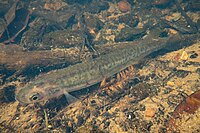
Photo from wikipedia
Helminth infections within tissues tend to be subjected to a host response that can include encapsulation and melanization to isolate the parasite. The effectiveness of this response depends on the… Click to show full abstract
Helminth infections within tissues tend to be subjected to a host response that can include encapsulation and melanization to isolate the parasite. The effectiveness of this response depends on the host species. During a survey of parasites of the native fish, Galaxias maculatus, we found conspicuous, strongly melanized exterior cysts located in the caudal peduncle of the fish. Dissection of these cysts exposed larval nematodes whose morphometrical features allowed their identification as Eustrongylides sp. Species of this genus are distributed worldwide. Galaxias maculatus was previously reported as second intermediate host to Eustrongylides sp. larvae, and the aquatic bird Podiceps major was cited as definitive host of Eustrongylides tubifex in Andean Patagonian lakes. The site of infection in the fish, and the host's response are unique among infections by larvae of Eustrongylides sp. in fishes, so the objective of this study was to describe the histological injury caused by larvae of the genus Eustrongylides parasitizing G. maculatus. Samples of fish were taken near the shore of Gutiérrez lake, in northwestern Patagonia. Some larval morphometric features were described to confirm the identity of larvae to generic level. Histopathological analysis (tissues sectioned at 5–7 μm, stained with Hematoxylin and Eosin, and Masson's Trichrome) of the caudal peduncle revealed almost complete disappearance of the epaxial musculature due to compressive atrophy and a chronic inflammatory response, associated mainly with a dense fibrotic capsule and an intense melanic deposit. This is the first description of the histopathology of an external cyst caused by Eustrongylides sp. larvae in fishes.
Journal Title: International Journal for Parasitology: Parasites and Wildlife
Year Published: 2019
Link to full text (if available)
Share on Social Media: Sign Up to like & get
recommendations!